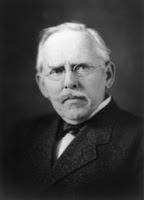I. Roosevelt and Jacob Riis
A. Police Commissioner Roosevelt--Roosevelt was asked to serve on the Board of Commissioners for the New York City Police Department after he turned down an opportunity to be a Street Cleaning Commissioner in 1894. Roosevelt had contemplated running again for mayor (reform candidate William L. Strong won the race, making Roosevelt even more rueful).
1. Edith Roosevelt's lackluster support--when Roosevelt discussed his candidacy with his wife, her reluctance to leave Washington, D.C. for the vagaries of New York City politics was visible, and Roosevelt withdrew his name from consideration as a candidate.
2. Temporary rift--Roosevelt gave in on this point, but immediately left to go on another western hunting trip. Upon his return, his continued brooding over this subject left his wife feeling somewhat ill at ease, but eventually Roosevelt got over this episode.
B. Jacob Riis--an immigrant from Denmark, migrated to the United States in 1870. His experience as an immigrant was an extremely difficult one, and acquainted him with the dark underside that was part of the immigrant experience. He eventually landed a job with the New York Tribune as a police reporter. His most famous bit of writing is contained in a book he produced, called How the Other Half Lives, which helped connect him with Theodore Roosevelt when Roosevelt became a police commissioner in the latter part of the 1880s.
1. Life as an Immigrant--Riis had a difficult experience as an immigrant to the United States.He arrived in the country as a skilled carpenter, but had much difficulty in finding steady work. Eventually, he had enough good fortune and hard work to return to Denmark to claim the love of his life--and then the couple returned to the United States
2. New York Tribune--After returning to the United States, Riis lived next door to one of the editors of the New York Tribune, and the paper agreed to make him their police reporter. This situation was reminiscent of his own immigrant experience, and he became determined to expose this unpleasant life to a wider public.
3. Riis takes up photography--although Riis' melodramatic way of writing effectively dramatized the conditions that he observed in the slums of New York City, Riis found that when he incorporated photography that his work had a much bigger impact.

C. Roosevelt and Riis--Riis was a great admirer of Roosevelt, and offered to take TR on guided tours of the seamy underside of the city; Roosevelt, looking to make his mark on the Board of Commissioners, readily agreed to this arrangement.
1. Traveling in disguise--both Roosevelt and Riis traveled throughout NYC in disguise, to ensure that the police were patrolling and doing the job they were hired to do. How effective these disguises were may be questioned, since to men traveled with an extensive entourage of newspaper writers to ensure that the event got the proper amount of press coverage.
2. Publicity--both men realized that the publicity these little jaunts to the seamy underworld were necessary to begin to change the conditions they encountered--nor did they do any harm to Roosevelt's political career.
a. In these little midnight escapades, Riis was able to demonstrate to Roosevelt the consequences of the rates that his rich friends derived from what they charged the working families they rented rooms in their tenements to.
b. The attendent publicity also made him a figure of some fun, with street merchants selling "Rosies"--false buck teeth to approximate his increasingly famous grin, as well as whistles to "warn" police of Roosevelt's imminent arrival. Roosevelt's ability to laugh at his own foibles was one of his most endearing personality quirks.








No comments:
Post a Comment